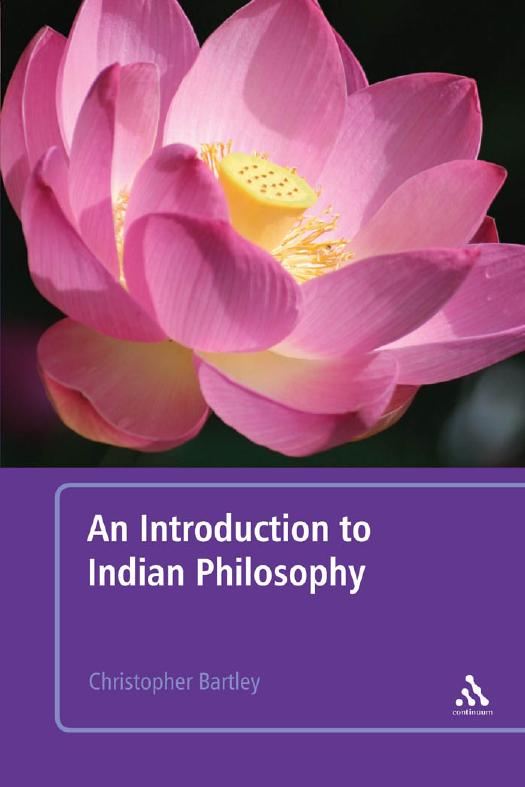An Introduction to Indian Philosophy by Christopher Bartley

Author:Christopher Bartley [Bartley, Christopher]
Language: eng
Format: azw3, pdf
Publisher: Bloomsbury Publishing
Published: 2015-07-29T16:00:00+00:00
Ślokavārttika IV, 111–120
As for the view that the logical reason (and other elements in an inferential sequence of thought) is not grasped by sensory perception because sensory perception does not involve conceptualizing: that view is false because concepts (vikalpa) are implicit in that they enable us to cognize the object. [111]
The idea is that any perception that is about some object (in contradistinction to a sensory impression that is of an object in the sense that it is caused by it) must be to some extent informed by conceptual thought. That Kumārila recognizes the non-cognitive character of sensation is apparent from verses 121–2 where he says that the sense-faculties are an instrumental cause of cognition but they are not cognitive.
In the first place here is cognition (jñāna) that is just seeing (ālocanā) and it is free from concepts (nirvikalpaka). It is produced from the pure entity and is like the cognitions of infants and the mute. [112]
Neither general (sāmānya) nor specific features (viśeṣa) figure explicitly in the content of awareness, but the individual that is their substrate is grasped. [113]
The next three verses refer to an Advaita Vedānta view that will appear in the writings of Maṇḍana Miśra (c.700 A.D.), who says that, ‘Initially there is non-conceptual perception relating to the bare reality of an entity (vastu-mātra). The ensuing conceptual cognitions comprehend its peculiarities.’ (Brahma-Siddhi 71.1-2).
Others say that there is an ultimate universal called ‘Substance’ or ‘Reality’ that is the sole object of perception. [114]
On the other hand, particularities (viśeṣa) are known by conceptual cognitions (savikalpa-buddhi). Some particularities are specific to an individual and others are shared by many. [115]
But perception that arises without taking account of particularities as either shared or specific does not differ whether it arises in relation to a cow or a horse. [116]
That is false because we apprehend a distinct form in the case of each individual entity. It is not the case that no differences are grasped just because we cannot apply a word to the object. [117]
Even in non-conceptual awareness (nirvikalpaka-bodhe’pi), there is an implicit apprehension of an entity as having both shared and specific features, although only a simple form is grasped by the cognizer. [118]
The entity is not identified in its uniqueness because it is not distinguished from others. A generic feature is not grasped because we do not notice any similarity with other entities. [119]
A subsequent cognition by which an entity is grasped in terms of its properties such as its universal and its qualities is also considered a form of perception. [120]
The denial by Buddhists such as Dignāga (and Advaita Vedāntins) that sensory perception is always non-conceptual is open to question. The same can be said about the other extreme that perception always involves explicit conceptual content: if that is true, it follows that infants and animals lack perceptual experiences. We see the latter view in the thought of the grammarian Bhartṛhari, who says [VP 1.131-2], ‘In this world there is no thought that is not associated with language. All cognition appears as pervaded by language.
Download
An Introduction to Indian Philosophy by Christopher Bartley.pdf
This site does not store any files on its server. We only index and link to content provided by other sites. Please contact the content providers to delete copyright contents if any and email us, we'll remove relevant links or contents immediately.
The remains of the day by Kazuo Ishiguro(7552)
Tools of Titans by Timothy Ferriss(6950)
The Black Swan by Nassim Nicholas Taleb(6192)
Inner Engineering: A Yogi's Guide to Joy by Sadhguru(5897)
Giovanni's Room by James Baldwin(5880)
The Way of Zen by Alan W. Watts(5800)
The Six Wives Of Henry VIII (WOMEN IN HISTORY) by Fraser Antonia(4791)
The Power of Now: A Guide to Spiritual Enlightenment by Eckhart Tolle(4756)
Astrophysics for People in a Hurry by Neil DeGrasse Tyson(4620)
Asking the Right Questions: A Guide to Critical Thinking by M. Neil Browne & Stuart M. Keeley(4576)
12 Rules for Life by Jordan B. Peterson(3734)
The Ethical Slut by Janet W. Hardy(3504)
Skin in the Game by Nassim Nicholas Taleb(3462)
Housekeeping by Marilynne Robinson(3402)
The Art of Happiness by The Dalai Lama(3385)
Double Down (Diary of a Wimpy Kid Book 11) by Jeff Kinney(3276)
Skin in the Game: Hidden Asymmetries in Daily Life by Nassim Nicholas Taleb(3264)
Walking by Henry David Thoreau(3235)
12 Rules for Life: An Antidote to Chaos by Jordan B. Peterson(3204)
